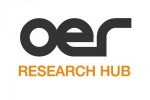Our OER Research Hub project began its first year probably the same way most research projects do –new staff establishing themselves into their new roles; developing key project management documents that would outline the framework of how the project would flow; developing of a research framework that would guide how we undertook research on the impact of OER on learning and teaching practices – a remit to which we had committed to the Hewlett Foundation.
The year continued with great collaboration and research with our 8 collaborations – OERRH visits to collaborations; collaborations’ visits to the OERRH and; various meetings to discuss and agree on research methodology that would produce mutually beneficial research.
Fellows: Our fellowship programme was an extension of our collaboration efforts through which we aimead to strengthen and create networks between practitioners, educators and OER experts. This programme features 13 fellows, 7 of whom have already visited the OERRH, bringing their knowledge and evidence to our project.
Events highlights: During the past year, our OERRH were represented at more than 30 events that brought together leading OER researchers and practitioners to discuss the ever-changing OER landscape. Some highlights for us have been OER 13 and Open Ed 2013 where our project was represented in full. Through our webinars, the OERRH promoted discussions around OER, such as policy and informal learning.
OERRH Data highlights:
- Educator belief that OER improve student performance is high, but this is less so for learners themselves
- Open licensing is important for educators but not for learners
- The main users of MOOCs and OER tend to be experienced learners
- OER are frequently used by students entering or continuing formal education to determine study direction
- OER use leads to reflection on teaching practice by educators
- There are considerable savings for learners using open textbooks with no detrimental effect on learning
- When selecting OER, users combine indicators that denote quality and also those that facilitate their own use of the resource
- Learners in formal education make better use of social network support structures than informal learners when learning with OER
- The broader acceptance of OER has laid the groundwork for increasing numbers of explicit OER related policies.
As we say goodbye to 2013 and look ahead to 2014, we are excited at the pipeline of activities that have potential to significantly impact the world of OER impact data. The next year, 2014, is poised to be a significant year for us – a year in which we plan to take on the global picture of OER impact – populating our Evidence Hub, with your help. We will also continue to share research findings and approaches at OER events
So, in 2014, we will concentrate on four pillars:
Researcher discovery: Sharing our research tools, including a researcher pack and launching a School of Open course on ‘How to conduct OER research on impact’;
Data analysis: In 2013 we have had the privilege to work with various collaborations; research fellows and other members of our network on gathering data from their communities. We now turn our focus to analysing and reporting that data;
Painting a global picture of OER impact: Our collaborations and our research data thus far have been, in the main, US-centric. In 2014, we look forward to widening our focus to include OER impact data and OER projects from around the world;
Dissemination: As well as continuing to host our own OER events, such as webinars, you can catch us at a number of upcoming OER events including OER 14; OCWC; eLearning 2014 and others. Publications in Open Access journals are also on the 2014 horizon.
As we say thank you to all our collaborations and network of ‘friends’ for the support throughout the first year of our OER Research Hub project, we would also like to extend our best wishes to you all for 2014. Seasons Greetings from the OER Research Hub project!
The following slides are a snapshot look at some of our year’s highlights:





















